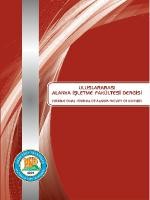2008 Küresel Finans Krizinden Sonra Diğerleri: Gelişen Ülke Ekonomilerinde Finans, Ticaret ve Bütçe Dengelerinin Analizi
2008 küresel finans krizinden sonra özellikle gelişmiş ekonomilerde ticaret, finans ve bütçe sorunları başlamıştır. Gelişen ekonomilerde ise kriz ortamında ekonomik performans yönünden dış ticaret, dış finansman ve bütçe açıkları gibi sorunlar ortaya çıkmıştır. Bu sorunlar, gelişen ülkeler açısından aynı şekilde gerçekleşmemiştir. Bazı ülkeler, krizden olumsuz etkilenirken bazıları krizden etkilenmemiştir. Bu çalışma, 2008 krizinden sonra gelişen ülke ekonomilerinin dış finansman, finans piyasaları, dış ticaret dengesi ve bütçe dengesi yönüyle krizden nasıl etkilendiğini analiz etmektedir. Değerlendirmeler küresel mali kurumların verilerine göre yapılmıştır. Bu verilere göre, krizden sonra, gelişen ülkelere sermaye akımları duraklamış, dış ticaret akımları kesilmiş, ancak bütçe sorunları açısından gelişmiş ülkelerdeki gibi sorun yaşanmamıştır. Krizden sonra gelişmiş ülkelerde bütçe açıkları %8’den fazla, gelişen ülkelerde %4 seviyesinde olmuştur. Bu durum, gelişen ekonomilerin 2008 krizinden nispeten daha az etkilendiğini göstermektedir.
Anahtar Kelimeler:
Gelişen Ekonomiler, 2008 Küresel Finans Krizi, Ekonomik Dengesizlik
2008 Küresel Finans Krizinden Sonra Diğerleri: Gelişen Ülke Ekonomilerinde Finans, Ticaret ve Bütçe Dengelerinin Analizi
After the 2008 global financial crisis, trade, finance and budget problems especially in developed economies have begun. In developing economies, problems about foreign trade, foreign financing and budget deficits in terms of economic performance during the crisis have emerged. These problems have not occurred in the same way in terms of developing countries. Some countries have been adversely affected by the crisis while others have not been affected by the crisis. This study analyzes how the economies of developing countries is affected by the crisis in terms of foreign financing, financial markets, trade balance and budget balance after the 2008 crisis. Assessments were made based on the data of global financial institutions. According to the data, after the crisis, capital flows to developing countries stagnated, foreign trade flows cut, but in terms of budget problems, there have not been as much problems in developed countries. After the crisis, budget deficit in the developed countries is more than 8 percent, but in developing countries it is 4 percent. This situation shows that emerging economies have been relatively less affected by the 2008 crisis. 1.GİRİġ 20. yüzyılın sonunda dünya ekonomisinde tarihi gelişimi yönüyle merkez ve çevre ekonomiler olarak ikili bir sınıflandırma yapılabilmektedir. Merkez ülkeler genel olarak ABD, AB ülkeleri ve Japonya’nın oluşturduğu gelişmiş ekonomilerdir. Çevre ülkeler ise sanayileşme ve teknolojik gelişme süreci halen devam eden ve ekonomik refahın göreceli olarak düşük olduğu gelişen ülke ekonomileridir (Kazgan,2005:30). Bu sınıflandırma 20. Yüzyıl boyunca çok fazla değişmeden devam etmiştir. Fakat 21. Yüzyılın hemen başında merkezdeki gelişmiş ekonomiler, konut piyasalarından kaynaklanan finans krizi ile ekonomik gelişme sürecinde 2008’den 2013’e kadar sürecek uzun süreli bir durgunluk dönemine girmiştir. Aynı dönemde 90’ların sonlarından itibaren hızlı bir değişim sürecine giren çevre ülkeler, hızlı büyüme trendine girmişlerdir. Bu makalede, dünya ekonomisinde 2008 finans krizinden sonra merkezdeki ekonomilerin karşısında gelişen ekonomilerin performanslarının analizi yapılmaktadır. Çalışmada gelişen ekonomilerin finans, ticaret ve bütçe performansları genelde uluslararası karşılaştırmalarla değerlendirilmektedir.
Keywords:
-,
___
- Amsden, A. H., The rise of „„the rest‟‟ : challenges to the west from late-industrializing economies , First issued as an Oxford University Press paperback, 2004, 1-28.
- Baldaci, E., Gupta, S.,Mulas-Granados, C.,“How Effective is Fiscal Policy Response in Systemic Banking Crises?” IMF Working Paper, 2009 (1-39).
- Bhagwati, J., The capital myth:The difference between trade in widgets and dollars, Foreign Affairs, May/Jun 1998;77,83.
- Borensztein, E., Gregorio, J De., Lee, J-W., (1998)“How Does Foreign Direct Investment affect economic growth?”, Journal of International Economics,45, 115-135
- Calvo, G.A., (1998), Capital flows and capital market crises: The simple economics of sudden stops, Journal of Applied Economics, vol. I, no. 1 (November), pp. 35-54.
- Das, D.K., Financial Globalization and the Emerging Markets Economics, Routledge, London-New York, 2004.
- Demir, Ö., Acar, M., Sosyal Bilimler Sözlüğü, 3.Baskı, Vadi yayınlar, Ankara, 2002.
- Garrett, G., “G2 in G20: China, the United States and the World after the Global Financial Crisis”, Global Policy Volume 1, Issue 1, January 2010, 29-39.
- Ghosh, A., Ramakrishnan, U., (2012) “Current Account Deficit: Is There a Problem?” Finance and Development, http://www.imf.org/external/pubs/ft/fandd/basics/current.htm
- Hoekman, B., “Trade Policy: So Far So Good ?” Finance & Development, June 2012, Vol. 49, No. 2, http://www.imf.org/external/pubs/ft/fandd/2012/06/hoekman.htm
- IMF, “Globalization And External Imbalances”, World Economic Outlook,2007, 109–156 http://www.imf.org/external/pubs/ft/weo/faq.htm#q4b
- IMF, “How does the WEO categorize advanced versus emerging and developing economies?” https://www.imf.org/external/pubs/ft/weo/faq.htm IMF, Fiscal Monitor- April-2012
- IMF, Fiscal Monitor- April-2014
- Kazgan, G., Küreselleşme ve Ulus Devlet, Yeni Ekonomik Düzen, İstanbul Bilgi Üniversitesi Yayınları, 4.Baskı, İstanbul, 2005. Kose, M.A.,Prasad, E., Rogoff, K., Wei, S-J.(2009), Financial Globalization: A Reappraisal, http://prasad.dyson.cornell.edu/doc/research/imfsp200836a.pdf
- Mishkin, (1992) “Anotomy of a financial crisis”, http://www.ppge.ufrgs.br/Giacomo/arquivos/esp207/mishkin-1992.pdf
- Radelet,S., Sachs, J., Cooper, R.N., Bosworth, B.P., The East Asian Financial Crisis: Diagnosis, Remedies, Prospects, Brookings Papers on Economic Activity, Vol. 1998, No. 1. (1998), pp. 1-90
- Tobin, J., “Financial Re-Globalization”,(1999) Options Politiques, Juillet-Aout, 1999,18-21
- Stiglitz J. E., “Reforming the Global Economic Architecture:Lessons from Recent Crises”,(1999) The Journal of Finance, Vol.54,No.4,1508-1521
- Yıldıran, M., (2010), Küresel Finans Krizinde Gelişen Ülke Ekonomileri: Çözülenler ve Yükselenler, İktisadi Araştırmalar Vakfı, Prof..Dr. M.Orhan Dikmen Araştırma Ödülü 2010/2, İstanbul, 2010.
- ISSN: 1309-1522
- Başlangıç: 2015
- Yayıncı: Akdeniz Üniversitesi
Sayıdaki Diğer Makaleler
Fast Food Restoranlarda Fiziksel Çevre, Fiyat Algısı ve Tekrar Satın Alma Eğilimi Arasındaki İlişki
Kemal Gürkan KÜÇÜKERGİN, Bekir Bora DEDEOĞLU
Teknoloji Kabul Modeli ve Sınıf Öğretmenleri Üzerinde Bir Uygulama
Kollektif Bilgi Üretiminde Reformsal Bir Yaklaşım Olarak World Cafe Tekniği
Münire ÇİFTÇİ, Umut Can ÖZTÜRK
Finansal Gelişmişliğin Makroekonomik Belirleyicileri: Türkiye İçin Bir VAR Modeli
Gönül YÜCE AKINCI, Merter AKINCI, Ömer YILMAZ
Birleşik Krallık Kamu Yönetiminde Kalite Yönetim Modellerinin Kullanımı
